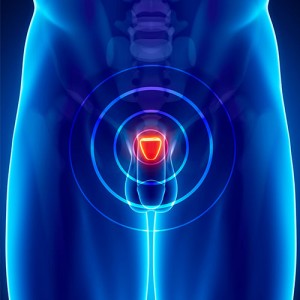 Prostate cancer usually starts to appear in men after the age of 55 and the average age of diagnosis is 70. There is an increased risk of this cancer for men whose father or brother has a history with the cancer. Though the exact cause of prostate cancer isn’t known, some evidence suggests that a diet high in fat may contribute, while a diet rich in fruits and vegetables may have a helpful effect.
Prostate cancer usually starts to appear in men after the age of 55 and the average age of diagnosis is 70. There is an increased risk of this cancer for men whose father or brother has a history with the cancer. Though the exact cause of prostate cancer isn’t known, some evidence suggests that a diet high in fat may contribute, while a diet rich in fruits and vegetables may have a helpful effect.
There are several tests that may be performed to help detect and diagnose prostate cancer:
- Digital Rectal Examination (DRE) – feel for an irregular or hard prostate gland
- Prostate Specific Antigen (PSA) – a blood test that measures a protein produced by the cells and the prostate gland
- Trans-rectal Ultrasound – rectal probe generates sound waves to produce an image of the prostate gland
- Cystoscopy Direct Visual Examination – pass a thin-lighted tube through the penis to examine the urinary bladder and prostate
- Biopsy – obtain a small piece of tissue from the prostate to sample the tissue from the prostate gland through the rectal wall
TREATMENT
Treatment options for prostate cancer are based on the grade and stage of the tumor, patient’s age, physical health, and personal preferences. There are several general treatments:
- Watchful Waiting – undergoing close, periodic follow-up with physical examinations, DRE, and PSA testing. This is most often recommended for patients over the age of 70.
- Radiation Therapy – utilizing X-ray energy to destroy the tumor cells via external radiation or radioactive seeds implanted during surgery
- Prostatectomy – surgical removal of the entire prostate gland
- Hormonal Therapy – male hormones are required for a prostate cancer to grow; testosterone is the most important male hormone. Reducing testosterone levels can be accomplished by medication and through surgery can put prostate cancer in a remission stage.
To receive a consultation with a physician and learn which option is best for you, schedule an appointment at either our Macon or Warner Robins locations.
